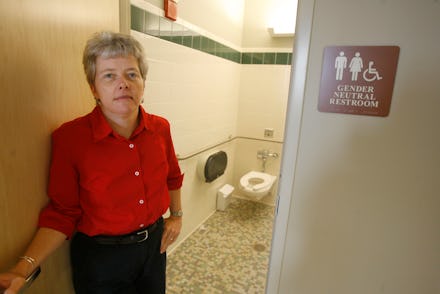5 Harmful Myths We Need to Stop Telling About Trans People and Bathrooms

Another month, another discriminatory bathroom bill.
State and local lawmakers have relentlessly targeted trans and gender nonconforming people in recent years, in part by introducing measures that aim to strictly govern how they use public bathrooms.
Most recently, in a 9-4 vote on March 4, a state house subcommittee in Florida advanced a bill that would prevent transgender people from using the bathroom corresponding to their gender identity. Instead, the measure would force them to go by the sex listed on their state-issued identification. Violations would be considered first-degree misdemeanors punishable by a $1,000 fine and up to a year in prison. A similar measure was proposed in Texas just last month.
Fined and imprisoned for simply using the bathroom? Yes, it's about as ridiculous as it sounds.
No one should be subjected to such degrading treatment. Bills like these exist due to pervasive stigma, discrimination and lack of education about transgender people. They're typically the result of faulty logic that sensationalizes what it means to be trans — logic that sounds something like this:
1. "This is just men wanting unnecessary access to women's bathrooms, and vice versa."
Calling a trans woman a "man" and calling a trans man a "woman" is an act of misgendering, and it's as offensive as it is violent. At a basic level, it betrays an ignorance that conflates the two distinct ideas of sex and gender. In reality, gender is a broad spectrum of possibilities not confined to the categories "man" and "woman," although that's how the majority of people identify.
It's already hard enough for trans people to ensure their gender identity is recognized by the law or by health care professionals, among other important services that their cisgender peers take for granted. Misgendering only furthers the ignorance and disrespect at the root of these and other indignities they encounter every day.
2. "Transgender people can just choose not to use public restrooms."
Speaking about the Florida measure last month with BuzzFeed, the bill's sponsor made it clear that this is what he believes. "People are not forced to go to the restroom," State Rep. Frank Artiles (R-Miami) said in the interview. "They choose to go to the restroom."
Let's see if that logic holds any water the next time this legislator, and anyone who thinks like him, impatiently shuffles around while waiting in a long line for a single-use bathroom.
3. "Trans people should have gender reassignment surgery before using public bathrooms."
Thinking through the logic of these "bathroom bills," one must ask: How would this stipulation even be enforced? Would it be an awkward game of examining a person's gender expression through their clothing or physical features? Or even more absurdly, would it require a pre-bathroom inspection of what's downstairs?
It's a better idea to allow each individual to use the restroom that they feel best corresponds to their gender identity. Instead of laws criminalizing bathroom usage, more legal protections and public education is necessary to ensure trans people can use bathrooms in peace.
4. "Trans people will use women's bathrooms to commit sexual assault."
Speaking about the Florida bill during a subcommittee session, Artiles said he believes "that criminals — males — will use this law as the cover to go into the women's locker room. All they have to say is 'I feel like a woman today.'"
This dubious framing aligns strictly gendered bathroom usage with upholding women's rights, falsely positioning anti-trans legislation as a tool to curb elements of rape culture. In fact, as Media Matters for America notes, experts in more than a dozen states have debunked the notion that sexual assaults happen when someone uses the bathroom they feel best corresponds with their gender identity.
Instead, this play on "trans panic" in the name of bathrooms reinforces a legal rationale that continues to prevent trans people from achieving justice. The "trans panic" defense has been successfully used in many courts to justify the murders of trans people, especially trans women, blaming cisgender attackers' violent actions on a person's gender identity. With trans people facing exceedingly high rates of harassment, assault and murder, arguments like these couldn't be more misguided.
5. "Trans people's presence in bathrooms will make others uncomfortable."
Trans people aren't using the bathroom to make anyone else uncomfortable, but rather to afford a moment of comfort for themselves. People use the bathroom for the same reasons, regardless of gender identity.
The issue of restrooms for trans individuals is not only a matter of preference; it's also a matter of safety. According to a study from the Williams Institute, 70% of trans respondents experienced some form of harassment or assault while trying to use public bathrooms. That's even in areas such as Washington, D.C., where regulations include some of "the strongest language in the country" intended to protect trans people from these kinds of issues, ThinkProgress notes.
Monica Roberts at TransGriot offered up a 12-step guide as to what trans people do when then enter a public bathroom this week as a public service. As she notes, these actions aren't something trans people "should spend a year in jail and pay fines for." Instead, comments about the "uncomfortable" or "repulsive" idea of sharing space with trans people is more of a reflection of anti-trans ignorance and bigotry — ideas that should be supplanted by education and empathy.
Here's hoping these anti-trans bathroom bills get royally flushed in the foreseeable future.